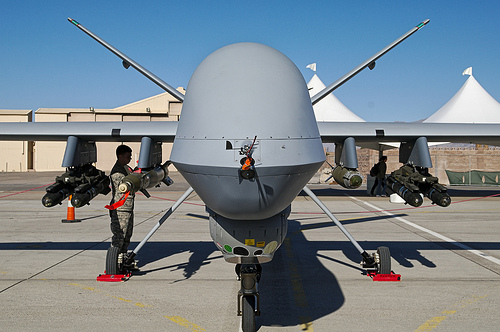
From Eric Schmitt, New York Times: Nearly every day, and sometimes twice daily, an unarmed American drone soars skyward from a secluded military airfield here, starting a surveillance mission of 10 hours or more to track fighters affiliated with Al Qaeda and other militants in neighboring Mali.
The two MQ-9 Reapers that are based here stream live video and data from other sensors to American analysts working with French commanders, who say the aerial intelligence has been critical to their success over the past four months in driving jihadists from a vast desert refuge in northern Mali.
The drone base, established in February and staffed by about 120 members of the Air Force, is the latest indication of the priority Africa has become for the United States at a time when it is winding down its presence in Afghanistan and President Obama has set a goal of moving from a global war on terrorism toward a more targeted effort. It is part of a new model for counterterrorism, a strategy designed to help local forces — and in this case a European ally — fight militants so American troops do not have to.
But the approach has limitations on a continent as large as Africa, where a shortage of resources is chronic and regional partners are weak. And the introduction of drones, even unarmed ones, runs the risk of creating the kind of backlash that has undermined American efforts in Pakistan and provoked anger in many parts of the world. . . .
The United States military, however, has only one permanent base in Africa, in Djibouti, more than 3,000 miles from Mali, as well as a constellation of small airstrips in places that include Ethiopia and Burkina Faso, for surveillance missions flown by drones or turboprop planes designed to look like civilian aircraft. The challenge for the United States, with little experience in Africa, is a difficult one. . . .
French, American and Nigerien officials all have a say in the daily missions of the drones, a Pentagon official said, but clearly the priority has been supporting the French campaign in Mali. The United States has flown more than 200 missions in support of the French, with the possibility that it could expand its operations to support a United Nations force largely composed of African troops that assumed control of the peacekeeping mission in Mali on July 1. . . .
As surviving fighters have melted back into the desert and mountains in recent weeks, the Reapers have been surveilling vast reaches of the north for signs of militant infiltration or secret new redoubts — a daunting task that one American official described as “looking through a soda straw” across the Sahara. At Niger’s request, American officials said, the drones may also conduct surveillance along the border before entering Mali.
Despite the gains, J. Peter Pham, the director of the Atlantic Council’s Africa Center in Washington, said the French were not fully using the information from the drones. The French forces, fearing attack from surface-to-air missiles looted from Libyan stockpiles, have curtailed helicopter gunship missions in Mali, and they instead rely on higher-flying but less precise fighter-bombers for any airstrikes, Mr. Pham said. But a French official said France had not carried out airstrikes in weeks and played down the missile threat. The official said that the intelligence was still being used to support ground operations. . . .
The American missions have not been without incident. On April 9, one of the drones crashed in a remote part of northern Mali, presumably because of a mechanical failure. “It was a total loss,” one Air Force officer said of the wreckage.
Pentagon officials say the drone missions will continue even as France reduces its force in Mali to about 1,000 troops by year’s end, from 3,500 now, “because we see a continued need for intelligence collection in that region,” said Amanda Dory, deputy assistant secretary of defense for Africa.
France has been impressed enough with the Reapers that it intends to buy at least two of the aircraft from the United States. “They’ve been absolutely necessary for us because we don’t have enough drones to protect our troops and to get permanent visibility about what’s happening on the ground,” said a French defense official in Paris. (photo: cclark395)
Image: cclark395%207%2011%2013%20Reaper.jpg
